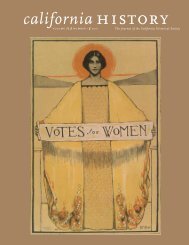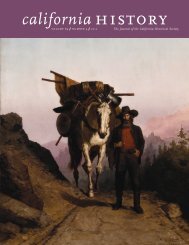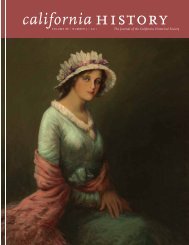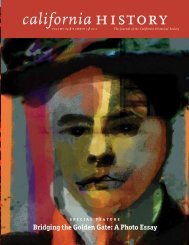Volume 90, Number 1 - California Historical Society
Volume 90, Number 1 - California Historical Society
Volume 90, Number 1 - California Historical Society
You also want an ePaper? Increase the reach of your titles
YUMPU automatically turns print PDFs into web optimized ePapers that Google loves.
to such evils as placing Indians under demoralizing<br />
restraint and punishing them bodily if<br />
they defied those strictures. Nor did he dwell on<br />
the moral complexities of his own position as<br />
a conqueror. Good might have come from the<br />
offense he caused by abducting Manuela had<br />
she and their child survived and his ties to her<br />
family lengthened and deepened, making him a<br />
bridge between the old regime here and the new.<br />
But the tragic consequences of that elopement<br />
prevented him from remaining long in Monterey<br />
as a guest of Angustias de la Guerra—who kept<br />
Manuela’s room just as it was before she married—and<br />
sent him into exile. He ended up on<br />
the Great Plains, that vast field of toil and strife<br />
east of Eden, where he served long and hard as a<br />
tenacious Indian fighter.<br />
intruSion and aCCoMModation<br />
Sully spent almost his entire career in the West.<br />
His one notable tour of duty in the East occurred<br />
in 1862, when he campaigned as a colonel in the<br />
Union Army during General George McClellan’s<br />
unsuccessful bid to seize the Confederate capital,<br />
Richmond. By then he had met the woman who<br />
would become his second wife, Sophia Webster,<br />
a resident of Richmond with whom he corresponded<br />
during the war. According to Langdon<br />
Sully, Alfred Sully’s grandson and biographer,<br />
“Sophia was a Southern sympathizer. When<br />
Alfred sent a note to her through the lines that<br />
he could ‘see the lights of Richmond,’ she sent<br />
a reply that he might see the lights but that he<br />
would never reach them.” 17 Before wedding her,<br />
In 1863–65, Sully commanded two far-ranging expeditions against hostile Sioux in the Dakota Territory. This photo-<br />
graph of an encampment Sully established during his campaigns suggests its isolation and primitive conditions.<br />
Of Sully’s leadership, Colonel M. T. Thomas of the Minnesota brigade wrote: “His perceptions were remarkably<br />
clear, and he appeared to know intuitively just where the Indians were and what they would do. These instinctive<br />
qualifications . . . rendered him fully competent for the duty to which he had been assigned, and, added to these, a<br />
genial temperament made him an agreeable commander.”<br />
Yale Collection of Western Americana, Beinecke Rare Book and Manuscript Library<br />
15









